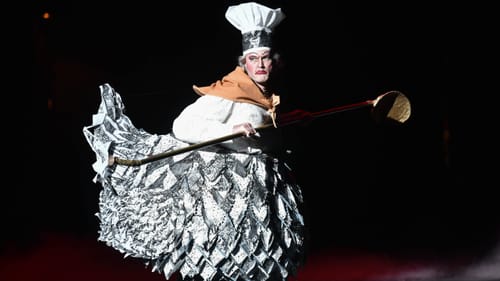Stay in the Loop
BSR publishes on a weekly schedule, with an email newsletter every Wednesday and Thursday morning. There’s no paywall, and subscribing is always free.
Fresh-squeezed fairy tale
Festival O19: Opera Philadelphia presents Prokofiev’s ‘The Love for Three Oranges’

Sometimes you encounter an unheralded work and wonder why it hasn’t achieved repertory status. Sometimes you encounter such a work and find that it deserves its obscurity. Sergei Prokofiev’s The Love for Three Oranges, a company premiere by Opera Philadelphia as part of its Festival O19, exists somewhere in the middle.
Prokofiev (1891-1953) certainly deserves his exalted place as a composer of symphonies and concerti, but his reputation in the opera house is up for grabs. I’m a particular fan of his Dostoyevsky-adapted The Gambler, and I’ve seen his War and Peace at the Met, but this was my first live experience of Oranges. The high comedy, which debuted in Chicago in 1921, is presented here in a snappy English translation by David Lloyd-Jones.
A brisk two hours
The brisk two hours contain a metric ton of whimsy, but just as often, I felt like I’d ingested a handful of raw sugar, aware that an acute stomach ache was soon to follow. Alessandro Talevi’s energetic production leans into the fanciful elements of the story, which is a fairy tale at its core. A sickly prince, cursed by a malevolent sorceress, embarks on a hero’s journey under the spell of the citrusy title trio. (Yes, it gets as weird as you might imagine.) Love wins the day, of course, as one of the oranges bears forth a bona fide princess. It really doesn’t get more complicated than that.
The opera includes a prologue that frames the action as a play-within-a-play, similar to Strauss’s near-contemporaneous Ariadne auf Naxos. Talevi and his set designer, Justin Arienti, use this as their jumping-off point, repurposing the cavernous Academy of Music as a Hollywood soundstage. Since much of Prokofiev’s musical language here presages early film scores, this proves a canny choice. It also allows lighting designer Giuseppe Calabró the opportunity to be particularly inventive with spotlights, floods, and washes, and for costumer Manuel Pedretti to embellish every ornate detail.
Admiring without humming
The mise en scène is always visually arresting, but it often seems needlessly busy, as members of the chorus (who sing well under Elizabeth Braden’s preparation) occasionally eclipse the leading players. Overall, though, I was grateful for Talevi’s panache throughout the stretches of the score that proved thorny. Some of the music is truly striking—Prokofiev could write a march—but the recitative-heavy music was sometimes an impediment to the singers rather than a service. The composer admirably wove Modernism into his vocabulary, but the result is not something you clamor to hum.
Any displeasure does not come from the forces of the Opera Philadelphia chorus, who perform exceedingly well under the baton of music director Corrado Rovaris. The percussionists, placed in the stage-level boxes, make a particularly memorable impact. The vocal side of the evening is also cast from strength—though bass Zachary James deserves special mention for singing and acting. He nearly walks off with the proceedings in his one-scene cameo as a deranged cook done up like a drag-queen Julia Child...who is also an egg-laying chicken. Really, don’t ask.

A strong cast
Jonathan Johnson sings The Prince with ardency, though the role is really a size too big for his character tenor. As his jester and sidekick Truffaldino, Barry Banks unleashes an instrument of ringing resonance and made a side-splitting impression without overselling the comedy. Several decades into an international career, his bel canto tenor remains a marvel of acuity.
Soprano Wendy Bryn Harmer crafts a distinctive Fata Morgana, playing the sorceress role with more than a trace of fortune-teller glamor. Bass Scott Conner wrings genuine pathos from The King of Clubs, The Prince’s father, and Academy of Vocal Arts alum Ben Wager makes a memorable impression with the magician Farfarello’s few lines. Alissa Anderson, a fast-rising contralto, deserves to graduate to a more substantial assignment than the one she’s given here, as the King’s conniving niece who plots to usurp the throne for herself.
Expanding the repertoire
Opera Philadelphia’s selection of this work fits with its mission to challenge audiences and expand the company’s repertoire. This year’s festival is refreshingly free of bread-and-butter titles; the other offerings include a rare full staging of Handel’s oratorio Semele and two world premieres. The adventurous choices seem to be paying off—opening night of Oranges found the Academy of Music surprisingly full.
I can’t imagine many—if any—of those in attendance left with a hankering to hear this opera again next season. But I’m sure many appreciated the chance to hear it in the first place. I know I did.
What, When, Where
The Love For Three Oranges. By Sergei Prokofiev, directed by Alessandro Talevi. Opera Philadelphia. Through September 29, 2019, at the Academy of Music, 240 S. Broad Street, Philadelphia. (215) 732-8400 or operaphila.org.
The Academy of Music is a wheelchair-accessible venue. Patrons can purchase accessible seating for Opera Philadelphia events online or by calling (215) 893-1999 during normal business hours. Assisted-listening devices are available on a first-come, first-served basis.
Sign up for our newsletter
All of the week's new articles, all in one place. Sign up for the free weekly BSR newsletters, and don't miss a conversation.

 Cameron Kelsall
Cameron Kelsall